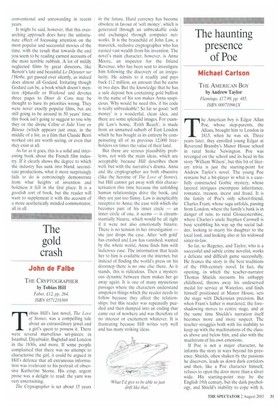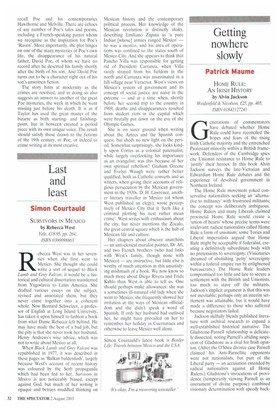The haunting presence of Poe
Michael Carlson
THE AMERICAN BoY by Andrew Taylor Flamingo, £17.99, pp. 485, ISBN 000710961X The American boy is Edgar Allan Poe, whose step-parents, the Allans, brought him to London in 1815, when he was six. Three years later, they enrolled young Edgar at Reverend Bransby's Manor House school in rural Stoke Newington. Poe was revenged on the school and its head in his story 'William Wilson', but this bit of literary trivia is just the starting-point for Andrew Taylor's novel. The young Poe remains but a bit-player in what is a carefully constructed Gothic mystery, whose layered intrigues encompass inheritance, romance, treason, incest and fraud. It is the family of Poe's only school-friend, Charles Frant, whose saga unfolds, passing from London, where the family's bank is in danger of ruin, to rural Gloucestershire, where Charles's uncle Stephen Carswell is busy scrabbling his way up the social ladder, looking to marry his daughter to the local lord, and looking also at his widowed sister-in-law.
So far, so Regency, and Taylor, who is a successful and subtle crime novelist, works a delicate and difficult game successfully. He frames the story in the best traditions of the 19th-century novel, In fact, the opening, in which the teacher-narrator Thomas Shields recounts his unhappy childhood, throws away his undeserved medal for service at Waterloo, and finds himself positioned at Manor House, sets the stage with Dickensian precision. But when Frant's father is murdered, the foreshadowing moves to centre stage, and at the same time Shields's narration itself becomes more and more suspect. The teacher struggles both with his inability to keep up with the machinations of the classes above and below him, and also with the maelstrom of his own emotions.
If Poe is not a major character, he informs the story in ways beyond his presence. Shields, often shaken by the passions he discovers, leads us down dark corridors and then, like a Poe character himself, refuses to open the door more than a sliver wide. His starting-point may be the English 19th century, but the dark psychology, and Shield's inability to cope with it, recall Poe and his contemporaries Hawthorne and Melville. There are echoes of any number of Poe's tales and poems, including a French-speaking parrot whom we recognise as the inspiration for Poe's 'Raven'. More importantly, the plot hinges on one of the many mysteries of Poe's own life, the disappearance of his natural father, David Poe, of whom we have no record after he deserted his family shortly after the birth of his son. And David Poe turns out to be a character right out of his son's unwritten fiction.
The story hints at modernity as the crimes are resolved, and in doing so also suggests an answer to another of the great Poe mysteries, the week in which he went missing just before his death. It is as if Taylor has used the great master of the bizarre as both startingand finishingpoint, but in between created a period piece with its own unique voice. The result should satisfy those drawn to the fictions of the 19th century, or Poe, or indeed to crime writing at its most creative.



























































 Previous page
Previous page